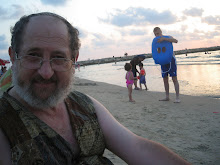obituary (april 8, 2008) - appeared in the Australian jewish News
BORIS GREEN 1913-2008
YEHIEL (JOHN), SAM AND JACK GREEN
BORIS (Dov-Baer) Green (Greniman) passed away on March 30, 2008 aged 95 years. He was one of the last surviving Jewish partisan leaders from World War II.
Boris was born in Disna, Byelorussia in 1913. He came from a family of watchmakers and had been taught this skill by his father Yehiel. He also had an interest in things technical, which would help him later survive the war.
The Russians invaded the area in 1939. Boris was inducted into the Russian Army and soon was in a leadership position. He rose in rank to be second-in-command of a supply base in Bialystock. War broke out on the Russian front in June 22, 1941 and he was among the few of his unit who survived and fled into the forests.
He trekked alone in the forest for one month until coming to a town called Vileika. There he was involved in organising a resistance group, but the Jews were massacred before they could rebel. He survived and was a witness to that atrocity. His testimony appears in the Vileika Yizkor book.
His brother Fima caught up with him and took him back to where he was living in Danilevich. They found that all the Jews had also been murdered there, including Fima's wife and child. They hid among the dead bodies and then fled when they could to the forests. They joined the Soviet partisan unit of Colonel Feodor Markov. Boris' technical skills proved to be useful and life saving for him and his brother, as he became the radio operator for the command post.
During this time, Boris and other Jewish partisans risked their lives to keep the Jewish families, hiding in the forests, alive with adequate food and clothing. Boris remained in Markov's partisan unit until leaving the relative security of his position, and initiating the setting up of an all-Jewish Partisan group called Nekomah. This unit was reinforced by fighters from the Vilna Ghetto and grew to become a significant fighting force saving other Jews, harassing German supply lines and conquering some military positions.
The leadership of the group by this stage had changed to Jacob Glazman, a Jewish leader from Vilna who was eventually killed in an ambush. Nekamah took in the remaining 250 fighters of the United Partisan Organisation of Vilna, including leading cultural figures from the Vilna Jewish community. Abraham Sutzkever, a prolific Yiddish poet and Israel Prize winner, wrote about Boris' exploits in saving the lives of many fellow Jews.
Ultimately, the Nekamah Partisan Unit was disbanded and Boris was put in command of a support/supply partisan camp. Prior to this, he had also sustained a bullet wound to his foot and was not able to further participate in active combat service.
In the first book describing Jewish partisan activities (Lehavot Baefer Flames in the Ashes), published in 1946 and written by Ruzka Korczak, she describes Boris Greniman as a legendary figure in the forests around Vilna saving Jewish lives.
After the war, he was in the Byelorussian military government in a senior position in its postal department. However, he used his position to forge documents, which allowed Russian Jews to escape the Soviet Union for Poland in the guise of repatriating Polish Jews. He fled when the scheme was discovered (and another official involved in the forging executed).
After some time in Western Poland and then France, he left for Australia.In 1949 Boris settled in Melbourne where his brother Fima had already started a new life.
In 1950 he married Chana Himelschein a Holocaust survivor from Warsaw. They were married for 58 years.
In Melbourne in the early 1950s there were thousands of Holocaust survivors whose families had perished. They set about rebuilding their lives. They set up an organisation of ex-concentration camp inmates, other Holocaust survivors and partisans, known as the Katzetler Farband. It was an educational, cultural, social and support network. For many years Boris Green was the secretary of this organisation. They would often meet at Boris and Chana's home.
Boris Green was a quiet man who spent the rest of his long life working as a watchmaker. He loved the technical side of it and, most of all, the interaction with his customers. He never wanted to retire and in fact continued working until three weeks before his passing.
He is survived by his wife Chana, three sons Yehiel (John), Sam and Jack and six grandchildren. Yehiel (John), Sam and Jack Green are Boris Green's sons.

